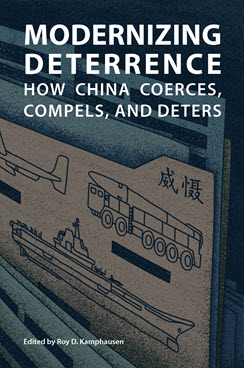Exploring Chinese Thinking on Deterrence in the Not-So-New Space and Cyber Domains
This chapter assesses Chinese military thinking on space and cyber deterrence and draws implications for the U.S.
EXECUTIVE SUMMARY
MAIN ARGUMENT
Besides nuclear deterrence, the space and cyber domains are viewed by China as its main means of strategic deterrence. A key commonality between these two domains is the nearly universal Chinese perception that the U.S. dominates and seeks to further entrench its hegemony. Combined with the broader perception of U.S. hostility, this reinforces a notion that the People’s Liberation Army (PLA) is weak, vulnerable, and at risk of coercion by the U.S., requiring a strong Chinese deterrence response. Chinese thinking on space and cyber deterrence is evolving. For space, China’s deterrence requirements are likely increasing. Early strategy was likely focused solely on the U.S., but current policy must also account for an India with anti-satellite capabilities. For the cyber domain, recent updates to Chinese military teaching materials suggest that the PLA has come to believe that deterrence requires demonstrating not only an ability to penetrate networks but also an ability to generate real effects. The space and cyber domains are thus key parts of “integrated strategic deterrence”—China’s conceptualization of the highest level of deterrence that draws on comprehensive national power.
POLICY IMPLICATIONS
- China views space and cyber as strategic domains and critical components of its overall deterrence strategy.
- China may increase its reliance on space and cyber deterrence if U.S.-China relations continue to worsen and the risk of conflict heightens.
- China’s approach to cyber deterrence may shift to demonstrating more real-world effects instead of merely revealing capabilities.
- The space and cyber domains are both at risk for misunderstanding during a future U.S.-China crisis due to likely differences in intentions versus perceptions of certain actions.
- The U.S. should include the space and cyber domains in its broader dialogue with China on strategic issues.
Nathan Beauchamp-Mustafaga is a Policy Researcher at the RAND Corporation, where he focuses on Asian security issues.



